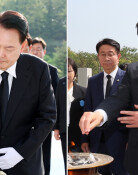The nation of soccer lost appetite for soccer
The nation of soccer lost appetite for soccer
Posted July. 11, 2014 06:45,
The aftermath was severe. After shocking 1-7 defeat to Germany in the semifinal of World Cup on Wednesday (in Korean time), most of Brazilians were stunned in anguish, past the stage of disappointment. In Sao Paulo on Thursday, one day after the humiliated game, there still remained vivid aftermaths from the defeat. The city was bustling with citizens going for work and doing their businesses as usual. However, there were several things different from the previous day. The number of national flags hanging around in the apartments was sharply reduced. It became hard to find people wearing yellow Brazil soccer jerseys. In the Sao Paulo stadium that hosted the semifinal game between Argentina and the Netherlands, only few were wearing yellow jersey. Brazil soccer uniforms, which were sold at high price in the sports shops, are now on discount.
Young Brazilian guys showed seven fingers shouting sete (meaning the number seven) whenever encountered with foreigners in the city. The number seven already became a symbol of humiliation and self-mocking gesture to Brazilians. Newspapers and media kept producing parodies with the number 7, mocking Brazils striker Fred who showed bad performance in the semifinal game and the national soccer teams Coach Luiz Felipe Scolari.
Now, soccer is neither festival nor hope to Brazilian people any more. Marcelo Machellar, a self-claimed big fan of soccer, said I probably wont see any soccer games played by Brazil for a certain time being. If I turn on the TV and see yellow soccer uniforms, Im afraid it will remind me of 1-7 defeat.
Severe aftereffects are seen in the arena of politics and public opinion. Chamber of Deputies in Brazil is now reviewing to have a hearing with president and vice-president of its football association after World Cup is ended. The chamber is preparing for thorough investigation on the preparation processes for World Cup. It is forecasted that the criticism and protests against hosting World Cup, which were dormant during the game, will raise its head again. Social groups that led protests against World Cup said Crushing defeat of the Brazil national team will fuel the anti-World Cup public opinions.
Brazilian people are now saying in one voice that they have become to pay more attention to the real life through the soccer games that they really liked. Felipe Mara, a reporter of Brazilian newspaper, said Brazils soccer game is quite similar to the overall economic and political aspects in Brazil. It seems that there is no problem on the surface but the problem comes up at some point later. I should say thank you to the Brazil national soccer team for letting me realize this fact.







